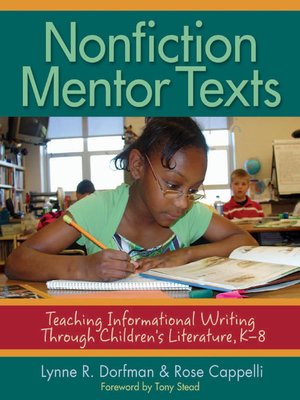Nonfiction Mentor Texts
ebook ∣ Teaching Informational Writing Through Children's Literature, K-8
By Lynne R. Dorfman

Sign up to save your library
With an OverDrive account, you can save your favorite libraries for at-a-glance information about availability. Find out more about OverDrive accounts.
Find this title in Libby, the library reading app by OverDrive.



Search for a digital library with this title
Title found at these libraries:
| Library Name | Distance |
|---|---|
| Loading... |
In their first book, Mentor Texts, Lynne Dorfman and Rose Cappelli demonstrated how teachers can use children’s literature to guide and inspire student writers of narrative fiction and poetry. Now, they have turned their focus to nonfiction, identifying a wide range of mentor texts and showing how these models illustrate the key features of good writing.
Lynne and Rose guide teachers through a variety of projects, samples, and classroom anecdotes that demonstrate how teachers can help students become more effective writers of good nonfiction. The Your Turn lessons at the end of each chapter use the gradual release of responsibility model to guide and empower student writers. Teachers will find especially helpful the information on how to select appropriate mentor texts from among the sometimes overwhelming offerings of children’s literature. Each Your Turn lesson encourages reflection and motivates students to think about what they’ve learned, the purpose of learning and practicing a skill or strategy, and how they might use this technique in the future. Additionally, An Author’s Voice provides encouragement and advice from published authors of children’s nonfiction.
One of the most valuable features of Nonfiction Mentor Texts is the treasure chest of books organized according to chapter. This list includes every title mentioned in the book, as well as a host of other titles that teachers can use to help students learn about quality nonfiction writing—building content, organizing text, developing voice, enhancing style, using punctuation effectively—and from which students can draw topic ideas. Lynne and Rose have either read or used all of the featured books in their classrooms and have selected titles that meet the needs of students at varying levels. Teachers will be able to find the just-right book for each student.







